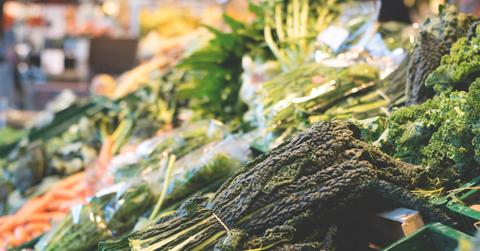New Tech Offers Lower Prices On Food Nearing Its Expiration Date
A new company called Wasteless offers the world’s very first real-time tracking technology to supermarkets so they can provide consumers with variable pricing based on a product’s upcoming expiration date. It's the "internet of groceries.”
Updated Nov. 19 2020, 9:39 p.m. ET
If a bag of kale on your supermarket’s shelf is on the brink of its expiration date, you should be able to buy it at a discounted price. Don't you think? That’s the logic behind Wasteless, a company offering the world’s very first real-time tracking technology to supermarkets so they can provide consumers with variable pricing based on a product’s upcoming expiration date. Think of it as “the internet of groceries.”
It’s time for supermarkets to end food waste once and for all. 
A tenth of all 133 billion pounds of food wasted in the United States every year is coming out of grocery stores, according to data from the United States Department of Agriculture.
There’s been no shortage of attempts to curtail this waste. One organization in Australia donates food surpluses and items past their expiration dates (but still edible) over to charities. Other groups have experimented with turning food waste into biofuel, or Walmart’s efforts to create a market for bruised produce. But what if you could just price perishable food accordingly as a way to move it off the shelves while curbing waste and continuing to offer stores profit?
That’s just what Wasteless has set out to do: Prevent food from going bad in the first place. The company’s system uses radio frequency identification (RFID) in tandem with a pricing engine that takes into account more than 40 variables to calculate prices. Those costs are displayed digitally with electronic shelf labeling. In this way, customers can choose to buy an item nearing its expiration date for less money.
“Dynamic pricing is something used daily when booking a flight, a hotel, or an Uber, and there is no reason why our groceries should be different,” Wasteless founder and COO Ben Biron said in a press release. “[This] means lower prices for the consumer, more revenue for the supermarket, and of course, it saves our planet by significantly reducing food waste at the retail level, which accounts for 40 percent of the world’s total food waste.”
Wasteless does away with the static pricing we’re used to. 
Say you’ve got a dinner party at your place this evening. You’re at the grocery store picking up some yogurt to create a dip, some greens for a salad, and a few other items. In this case, it might be attractive to you to buy the items nearing their expiration dates for a small percentage of their full retail value. After all, odds are they’ll all be consumed tonight.
Meanwhile, someone else who lives alone and is buying a carton of milk might be willing to pay full price in order to have it last as long as possible at home.
Wasteless would allow supermarkets to electronically (and automatically) adjust prices as needed on any item while also keeping track of inventory. If the store were running low on broccoli, for example, an alert would be issued for restocking. In this way, supermarkets can curb food waste on both ends of the supply chain with smarter ordering and less wasted inventory—helping to recoup a large portion of the $57 billion this country’s grocery industry loses every year. That just seems like good business sense; and good for the environment, to boot.
